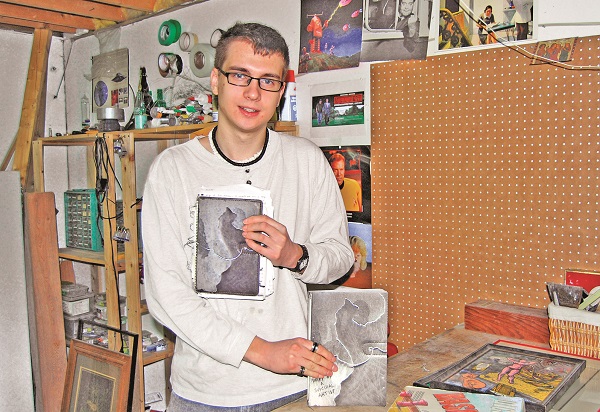Archive
Author hopes people can learn from diaries charting very personal struggle
January 28, 2015 · 0 Comments

Three years ago, Andreas Pfundt was in a dark place.
He was going through emotional difficulties, financial challenges from trying to carve out a career in the independent film industry, battling his way constantly through anger and despair.
After weighing his options, however, he decided against a drastic approach to his problem, instead channeling his anger and emotions onto the page.
The result is “The Diary of a Suicidal Artist”, a 364-page new book created by the Aurora artist, charting his recovery from “severe anxiety, depression and obsessive compulsive disorder.”
“In a weird way, part of me thought that whenever I died I imagined there would be a little bit of history of myself just around for a few seconds, something that is tangible that people can obtain in the future and reflect upon,” says Mr. Pfundt on why he decided to lay everything bare on the page. “I also wanted to help other people out with this. I was battling the idea of going public with it, as I mention in my diary entries, but it was more about helping other people with depression, anxiety and all these other labels doctors constantly give their patients. It is to show them they are not alone.”
The book is more than just a diary. It is also a compilation of his drawings and other forms of art.
“In a way, I have never been so influenced by art,” he says. “I get inspired by other artists, but I think I biologically inherited it from my family. My dad is an artist and a lot of my relatives back in Europe have artistic talents in acting and singing. Art is almost not even something I wanted to do, but almost like a little tick inside my chest that made me want to express myself in a visual medium.”
While he had an appreciation for art from a very young age, he was also aware of his emotional challenges from an equally formative age. He says he first had this feeling around the age of seven when his parents and other family members were going through divorces. There was a lot of “animosity” in his house and between his parents.
“As an only child, I sort of had to raise myself,” he says. “I didn’t have anybody else to help me out with that. I had to be constantly batting between things my mom was saying, things my dad was saying, and I had to become this devil’s advocate all the time, and that is constantly shown in myself today. I don’t think there is an hour that has gone by where I haven’t thought of hurting myself, but I have slowly come to fix those problems and I think this diary has helped me make a lot of major improvements.
“When you write something down and you look at it after, I initially felt very self-sympathetic, but when I looked at the diary after I had written it and reflected upon it, I realised I am a constantly changing person. I was always taking medication and things for my illnesses and I felt like maybe medication can only take you halfway through those mental problems that people go through. The other half is helping yourself and as I go through this book, I feel I have helped myself just by creatively vomiting all over the pages.”
Andreas, 24, grew up in Aurora. After pursuing his career for four years in Vancouver, he came back home to Aurora to “unwind and relax” after his challenges came to a head. Here, he found peace and contentment with his family and managed to complete his project.
After completing the diary, Andreas says he wasn’t sure what his family’s reaction would be, but telling them slowly and deliberately what his intentions were in putting his very personal struggles on the page, they came around to the idea with understanding.
“My parents said there were some pages they probably wouldn’t have been able to read because…it is a very intense book, dark and sad, but it does have its humourous moments in a dark and twisted way, but they took it very well, surprisingly. One thing I remember people telling me when I tried to open up to other people and talk about my problems is that it was mind over matter, but a lot of people misunderstand the whole concept behind depression, anxiety and obsessive compulsive disorders.
“I think it is important for you to express yourself, even if it is the weirdest, most bizarre thing. Find some sort of outlet to help yourself out. For me, it was this diary. For others it could be doing weird things like juggling, or flying kites, or something that helps you get in tune with yourself, even talking to a psychologist…It helps you immensely. Medication has taken me to the halfway point of my life where I am still focusing on fixing these problems but a lot of that fixing process has to be done by yourself with alternative methods.”
The Diary of a Suicidal Artist can be found at online retailers, including Amazon.











